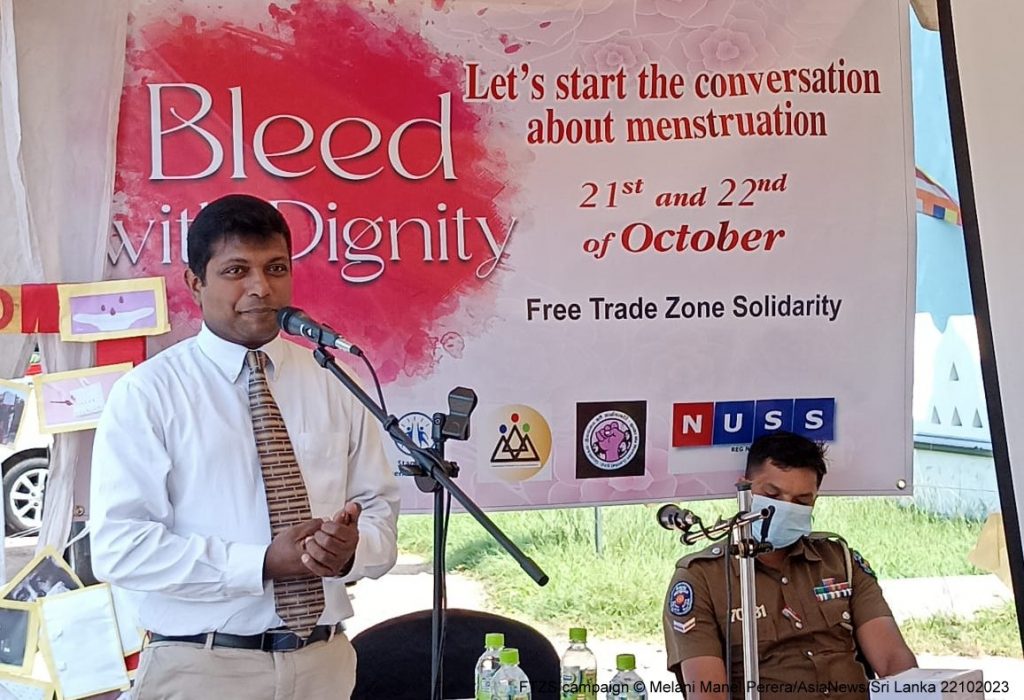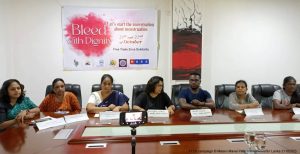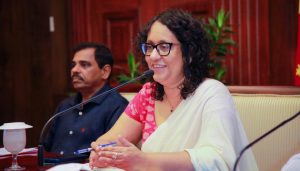Pay more attention to working-class women – Free Trade Zone’s Solidarity say

The majority of female workers who shoulder the economy of Sri Lanka and school-going girls of Sri Lanka, mainly female workers in Sri Lanka’s Free Trade Zone (FTZ), currently are facing a huge health problem. If the problem is not considered a social problem, and if the government does not present a program to solve the problem, another new issue will be socialization soon, said the Free Trade Zone’s solidarity. Several demands are made to the government and authorities. Addressing the challenge, they started programs for FTZ women workers to make them aware from Sunday.
By highlighting “how unfair” it is to the health needs of the working-class women who earn the country’s wealth and the school-going girls, who are the lifeblood of the country, to “become a poverty”, the Free Trade Zone Solidarity said that authorities and the government must come up with solutions before it becomes a big social problem. They said so at a press conference, held on the 21st of October at Katunayake. And conducted an awareness by a medical Doctor, a Nurse, and a Police Officer for working-class women in the FTZ throughout the day on Sunday.
Police Officer for working-class women in the FTZ throughout the day on Sunday.
“For the majority of working-class women including working-class women in the Free Trade Zone who generate a large number of dollars for Sri Lanka’s economy, the fact that their health needs to be faced monthly has become one more trouble and oppression to their lives, it has brought severe suffering to the production process, job satisfaction, and mental health,” said Chamila Thushari, Executive Director of Da Bindu Collective.
The Free Trade Zone’s Solidarity, which strongly condemns the disrespectful treatment of working-class women by some managers and officials on these days of their special monthly health needs, Chamila Thushari said that starting from the trade zone, the employees will be informed nationwide, and at the same time, they will start making an impact by directing their suggestions and requests to the government, the managers of the institutions, and the authorities.
“In countries like Nepal and Bangkok, you can buy sanitary napkins for 45 rupees. Even women in our country have to spend 300 to 500 rupees to buy a pack of sanitary napkins.” expressed the views of all those who spoke at the media briefing on behalf of Free Trade Zone’s Solidarity.
“it is very unfair that a woman is forced to spend a significant amount of the minimum wage on sanitary napkins because a large tax has been charged on it.” they also pointed out.
Therefore, they said that they are asking the government to reduce the tax without charging so much tax for a substance that is used for a function that occurs biologically in the female body.
“We request the Branders should pay more attention to the health conditions and health needs of women in their code of conduct, managers of the institutes are requested to be more kind to the women workers during the period of menstruation and provide facilities for them to get the soap, water and sanitary napkins as they need.” Said Chamila Thushari to the media.
requested to be more kind to the women workers during the period of menstruation and provide facilities for them to get the soap, water and sanitary napkins as they need.” Said Chamila Thushari to the media.
And since civil organizations are not allowed to go inside the factories to educate the workers, the government was requested to connect the offices of the medical officer of health (MOH) for that awareness.
“In Sri Lanka today, this issue or the poverty of need is not a popular topic. It is not discussed. The majority of women who shoulder the economy in Sri Lanka are facing poverty in this sense. It has become a serious problem for the meager amount they earn and their economy. And 50 percent of school-going girls lose their education during that time due to this poverty because they don’t go to school on those days. They have no money to purchase such high-priced sanitary towels. How much of a crime is that? That’s why the menstrual poverty facing the working community and the girl child has become a silent burning problem in society.” said Ashila Dandeniya, Executive Director of the Sri Lanka Organization.
Ashila Dandeniya said that they are working on this problem as it is a serious problem of working women in the region, and if this problem is not discussed and found solutions as a society, if the government does not present a program to solve this problem, it will soon become a serious social problem.
She also said that the government should immediately change the high tax imposed on sanitary napkins and make them affordable for women’s wallets.
About 100 working-class women from FTZ were given a whole-day awareness by the medical Doctor Gayan Senaratatne, Nursing Instructor Anurddhika Iroshini, and Police Officer S. J. Sanjeewa at around Katunayake FTZ area.
Participants were given packets of Sanitary napkins and they said that the awareness program was a very useful program they received with many details.
The knowledge we had was developed and gained some new knowledge to strengthen our lives.” after the program Dinithi and Nadeeka Priyadha
The Free Trade Zone’s Solidarity consists of organizations such as Da Bindu Collective, Stand Up Sri Lanka, Shramabhimani Kendraya, We Women Lanka, RED Institute, and NUSS which work for the rights and welfare of women and men workers working in the Free Trade Zones in Sri Lanka.
END









